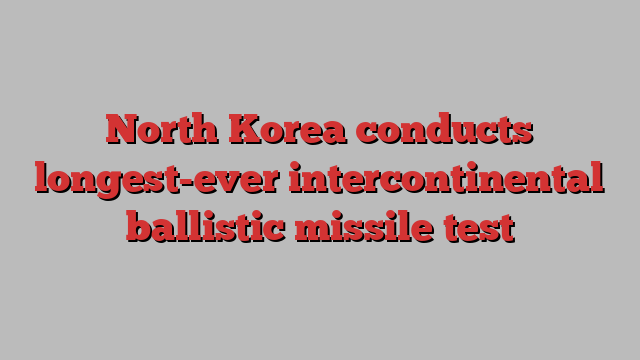
Unlock the Editor’s Digest for free
Roula Khalaf, Editor of the FT, selects her favourite stories in this weekly newsletter.
North Korea conducted its longest-ever test of an intercontinental ballistic missile on Thursday, hours after US and South Korean defence chiefs condemned Pyongyang’s deployment of troops in Russia’s war against Ukraine.
The missile was launched on a lofted trajectory from Pyongyang just after 7am and landed in waters about 200km west of the northern Japanese island of Hokkaido, Japan’s defence ministry reported.
South Korea’s defence intelligence agency had briefed lawmakers on Wednesday that North Korea was preparing for an ICBM test to attract Washington’s attention ahead of the US presidential election next week.
In a statement released by North Korea’s state news agency on Thursday, the country’s leader Kim Jong Un described the launch as “an appropriate military action that fully meets the purpose of informing rivals . . . of our counteraction will”.
North Korea “will never change course on the line of strengthening nuclear forces”, Kim added.
The test, Pyongyang’s first launch of an ICBM potentially capable of striking the US mainland in almost a year, reached its highest-ever altitude and lasted 86 minutes, the longest-ever flight time for a North Korean missile, according to Japan’s defence ministry.
Defence analysts said the record flight time suggested North Korean ICBMs were likely to be capable of reaching more distant targets and delivering heavier payloads.
Japan’s defence minister Gen Nakatani called the test “a threat to the peace and security of our country and the international community and is totally unacceptable”.
Major General An Chang-myong, a spokesperson for South Korea’s joint chiefs of staff, condemned the launch as an “illicit and reckless provocation” and urged Pyongyang “to immediately cease all actions harming peace and stability on the Korean peninsula and the international community, including . . . the deployment of cannon fodder mercenaries to Russia and preparations for a nuclear test”.
About 3,000 North Korean troops have been deployed to Russia’s western Kursk region, where they are expected to support Moscow’s efforts to retake territory seized by Ukraine, according to Ukrainian intelligence officials. The deployment would mark the first time a foreign army has intervened in Russia’s war against Ukraine with its own troops.
The South Korean military said the ICBM appeared to be a “solid fuel missile”, which can be fuelled in secret before it is deployed, potentially giving adversaries less time to conduct a preventive strike. Seoul announced a package of sanctions designed to hinder North Korea’s solid fuel missile development following the launch on Thursday.
Speaking at a meeting with US defence secretary Lloyd Austin in Washington, South Korea’s defence minister Kim Yong-hyun said there was a “high chance” that Pyongyang was seeking Russian defence technologies to aid its nuclear, satellite, submarine and missile programmes in exchange for the troop deployment.
Austin warned that the North Korean troop deployment risked “lengthening or broadening the conflict”.
Additional reporting by Felicia Schwartz in Washington